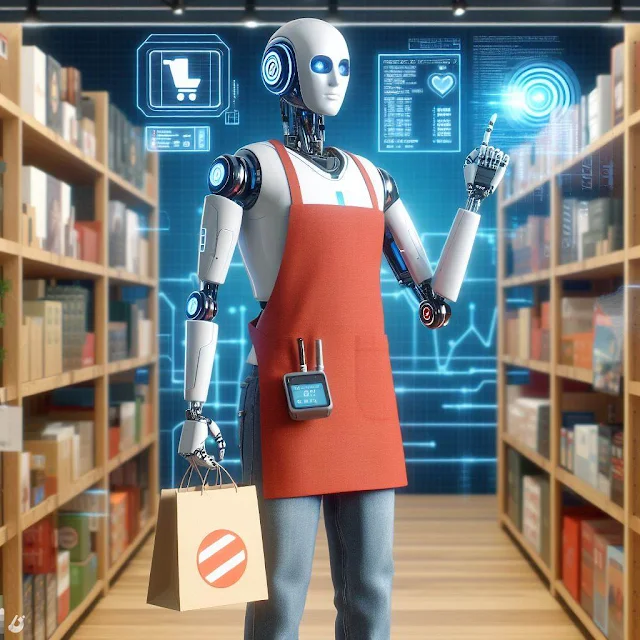AI Revolution: Transforming the Retail Landscape
Introduction:
In recent years, the retail industry has undergone a profound transformation, with Artificial Intelligence (AI) emerging as the catalyst for change. This revolution is not merely an upgrade; it represents a fundamental shift in how retailers operate, engage with customers, and optimize their processes. In this exploration, we delve into the multifaceted impact of AI on the retail market and industry, unveiling the innovative changes steering this evolution.
1.
**Enhanced Customer Experience:**
The bedrock of AI's influence in retail lies in its ability to elevate customer experiences. AI-powered chatbots and virtual assistants provide personalized, real-time support, guiding customers through their shopping journey. Machine learning algorithms, analyzing extensive datasets, offer hyper-personalized product recommendations, creating an engaging and satisfying shopping experience. This heightened interaction not only fosters customer loyalty and trust but also significantly enhances brand perception.
Additionally, AI's influence extends to post-purchase interactions. Automated follow-ups, personalized recommendations based on previous purchases, and proactive issue resolution contribute to an ongoing positive customer experience, creating a cycle of engagement that goes beyond the initial transaction.
2.
**Intelligent Inventory Management:**
AI is reshaping inventory management by bringing intelligence to stock control. Predictive analytics and machine learning algorithms, fueled by historical sales data and market trends, accurately predict demand. This leads to optimized stock levels, reducing instances of overstock and understock, and mitigating the risk of product obsolescence. The outcome? Enhanced operational efficiency, substantial cost savings, and a more responsive supply chain for retailers.
Taking this a step further, AI-driven inventory management systems enable predictive maintenance for equipment and machinery within the supply chain. This proactive approach minimizes downtime, ensuring smooth operations and reducing unforeseen costs.
3.
**Dynamic Pricing Strategies:**
Retailers are leveraging AI for dynamic pricing strategies. AI-driven algorithms adjust prices in real-time based on market demand, competitor pricing, and other relevant factors. This dynamic pricing not only ensures competitiveness but also reflects changing consumer preferences. Moreover, personalized pricing models, tailored to individual customer behaviors and preferences, are becoming a reality, fostering increased customer satisfaction and loyalty.
Expanding on this, AI enables retailers to conduct comprehensive pricing sensitivity analyses, allowing for the identification of optimal pricing points for various products and customer segments. This data-driven approach ensures that pricing strategies align with market dynamics and consumer expectations.
4.
**Streamlined Supply Chain Operations:**
AI's impact on the supply chain is revolutionary. From route planning to warehouse management and demand forecasting, AI algorithms optimize every facet of the supply chain. The result is streamlined operations, reduced costs, and a more responsive supply chain. Real-time insights empower retailers to anticipate demand fluctuations and make informed decisions, contributing to sustainability and resilience in the supply chain.
Going beyond optimization, AI enhances supply chain visibility and traceability. Blockchain technology, often integrated with AI systems, ensures transparent and secure data sharing throughout the supply chain, reducing the risk of errors, fraud, and enhancing overall supply chain integrity.
5.
**Personalized Marketing Campaigns:**
AI's role in marketing extends beyond conventional strategies. Deep insights into customer behavior and preferences, facilitated by AI-driven analytics, enable highly targeted and personalized marketing campaigns. From personalized product recommendations to individualized promotions, AI ensures that retailers connect with customers on a personal level. This not only fosters brand loyalty but also significantly boosts conversion rates, driving revenue growth.
To amplify the impact, AI-driven marketing campaigns can leverage geolocation data, social media sentiment analysis, and real-time customer interactions to deliver contextually relevant content. This level of personalization enhances customer engagement and strengthens the brand-consumer relationship.
6.
**Innovations in Brick-and-Mortar Stores:**
Even traditional brick-and-mortar stores are undergoing a technological revolution with AI. Facial recognition enhances security and personalizes in-store experiences, while smart shelves equipped with sensors provide real-time inventory data, optimizing stock levels. Cashier-less checkout systems, powered by AI and computer vision, enhance the overall shopping experience, reducing waiting times and improving efficiency. These innovations are crucial in blending the convenience of online shopping with the tangible experience of in-store visits.
Further innovations include AI-driven virtual try-on experiences, where customers can visualize products in real-time without physically trying them on. This immersive technology enhances the in-store experience, bridging the gap between physical and digital retail environments.
The
Future of Retail with AI:
As we peer into the future, the collaboration between human intelligence and artificial intelligence holds immense potential. AI is not merely a technological upgrade but a strategic imperative for retailers navigating the complexities of a dynamic market. Those who strategically leverage AI technologies are poised to lead the industry, setting new benchmarks for innovation and customer-centric solutions.
Conclusion :
In conclusion, the AI revolution is not just a buzzword; it's a transformative force reshaping the retail landscape. Embracing this revolution isn't just an option; it's a strategic necessity for retailers looking to thrive in the evolving retail landscape. The future of retail lies in seamless, efficient, and deeply personalized experiences, and AI is undeniably the driving force propelling the industry toward unparalleled growth and innovation.






.jpg)






0 Comments